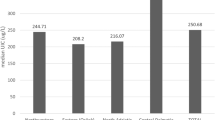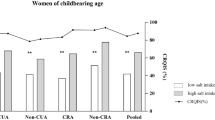Abstract
Background: Several countries with long-standing salt iodization programs, including Switzerland, have recently reported declining and/or low urinary iodine (UI) levels in their populations. In Switzerland, in response to studies indicating low UI levels in children and pregnant women, the salt iodine level was increased in 1998 from 15 to 20 mg/kg.
Objective: Our objective was to evaluate iodine nutrition in a national sample of Swiss school children and pregnant women 8–16 months after the increase in the salt iodine level.
Design: A 3-stage probability proportionate to size cluster sampling method was used to obtain a representative national sample of 600 children aged 6–12 y and 600 pregnant women. We then measured UI in both groups, thyrotropin (TSH) in pregnant women and thyroid volume by ultrasound to determine goiter prevalence in school children.
Results: The median UI (range) of the children and pregnant women was 115 μg/l (5–413) and 138 μg/l (5–1881), respectively. The median blood TSH concentration (range) of pregnant women was 0.6 mU/l (0.2–2.1). Based on the current WHO/ICCIDD normative data for thyroid volume, none of the children were goitrous, using either age/sex-specific or BSA/sex-specific cutoffs.
Conclusions: The iodine status of the Swiss population is once again adequate, illustrating the value of periodic monitoring and prudent adjustments to the iodine level in salt. This approach could serve as a model for countries struggling to maintain dietary iodine intake in the face of shifting dietary habits and changes in the food supply.
Sponsorship: Swiss Foundation for Nutrition Research, Zürich, Switzerland; Foundation for Micronutrients in Medicine, Rapperswil, Switzerland; and Swiss Federal Institute of Technology in Zürich, Switzerland.
European Journal of Clinical Nutrition (2001) 55, 162–166
This is a preview of subscription content, access via your institution
Access options
Subscribe to this journal
Receive 12 print issues and online access
$259.00 per year
only $21.58 per issue
Buy this article
- Purchase on Springer Link
- Instant access to full article PDF
Prices may be subject to local taxes which are calculated during checkout
Similar content being viewed by others
Author information
Authors and Affiliations
Contributions
Guarantor: SY Hess.
Contributors: All investigators contributed to the study design. SH coordinated the study, collected data and assisted in writing and editing the paper. TT and HB supervised the completion of the analytic work and edited the paper. MZ and RH initiated and coordinated the study, contributed to data analysis and the writing and editing of the paper.
Corresponding author
Rights and permissions
About this article
Cite this article
Hess, S., Zimmermann, M., Torresani, T. et al. Monitoring the adequacy of salt iodization in Switzerland: a national study of school children and pregnant women. Eur J Clin Nutr 55, 162–166 (2001). https://doi.org/10.1038/sj.ejcn.1601140
Received:
Revised:
Accepted:
Published:
Issue Date:
DOI: https://doi.org/10.1038/sj.ejcn.1601140
Keywords
This article is cited by
-
Iodine intake in the Swiss population 100 years after the introduction of iodised salt: a cross-sectional national study in children and pregnant women
European Journal of Nutrition (2023)
-
Effectiveness of increased salt iodine concentration on iodine status: trend analysis of cross-sectional national studies in Switzerland
European Journal of Nutrition (2020)
-
Iodine status of 8 to 10 years old children within 20 years following compulsory salt iodization policy in Shanghai, China
Nutrition Journal (2019)
-
A Comparative Study of Iodized Salt Programs: Shanghai and Switzerland
Biological Trace Element Research (2019)
-
Pediatric adiposity stabilized in Switzerland between 1999 and 2012
European Journal of Nutrition (2014)



